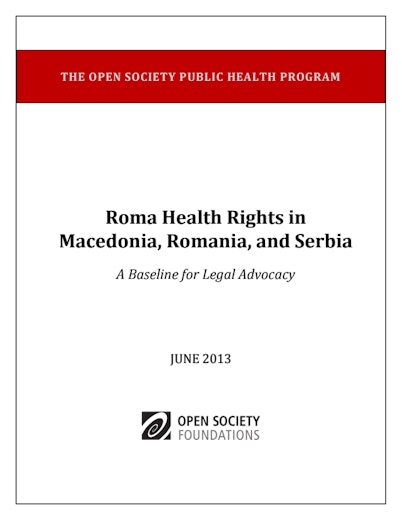Legally Invisible, Fighting for Health Care
By Tamar Ezer
Vela does not officially exist.
Although she has lived in Macedonia all her life, neither she nor her four children have access to health services. Like hundreds of Roma, Vela—whose name has been changed to guard her privacy—is legally invisible.
Many were caught without legal documents in the transition from the former Federal Republic of Yugoslavia. Their children, in turn, were never registered. The situation is exacerbated by a third generation without birth certificates.
Sometimes the only way to prove legal existence is through a DNA test showing relation to a Macedonian citizen.
Without identity documents, Vela and her four children are barred from health care, education, and other social services in Macedonia.
“I thank the Lord for my children not being seriously ill so far,” she says, “but they are crippled because, like me, they do not know to read and write. Like every mother, I want them to study and get a job.”
For Roma who manage to access it, the health care system in Macedonia remains a place of stigmatization, discrimination, and violations of basic rights. The experience of another Roma woman, Sazije, is a case in point. When she hurt her shoulder, a doctor placed a cast on her lower arm. When she tried to point out this error, the doctor refused to listen and retorted that if she did not like his treatment, she should seek help elsewhere.
Sazijie ended up having to see a different specialist, who then had to break and reset the bone in order for it to heal properly.
With the help of Roma NGOs, Vela and Sazije are taking action to claim their rights. Vela is working with a lawyer at LIL (which means “book” in Romani), to present DNA evidence of her relationship to her brother and obtain legal recognition. Sazije went to the Humanitarian and Charitable Association of Roma (KHAM), which—together with the Association for Emancipation, Solidarity and Equality of Women (ESE) and Roma SOS—helped her initiate court proceedings against the hospital.
“I cannot describe the difficulties and humiliation I experienced,” Sazije said. "My pain could be relieved only if justice was done for everything that had happened, in the hopes that others would not have to go through the same ordeal.”
ESE, KHAM, LIL, and Roma SOS are all part of an Open Society Foundations initiative on legal advocacy for Roma health rights. Recognizing the impact of human rights violations on health and the potential of legal tools to address this, we have been supporting this work since late 2010.
Although these projects are young, they are already bearing results. In the Macedonian town of Delchevo, doctors used to charge Roma parents for required medical certificates, which are supposed to be free, when their children were ill and had to miss school. Since the establishment of a Roma paralegal program by ESE and KHAM focused on health rights, this is no longer the case.
Additionally, Roma SOS reports that complaints from Roma patients are causing a decrease in the confiscation of identity and health documents for inability to cover fees. Through this initiative, Roma SOS also successfully challenged an administrative provision under the Health Insurance Law requiring the submission of documents to verify income. This requirement was difficult for seasonal workers, who are disproportionately Roma, excluding them from care. Through Roma SOS’s efforts, this verification document is no longer necessary.
The law shapes access to health care, as well as the services provided. Increasingly, legal strategies pursued by Roma communities are both protecting rights and improving health. It is not enough to have good laws—we must make sure they work for Roma patients.
Until June 2016, Tamar Ezer was deputy director of the Law and Health Initiative of the Open Society Public Health Program.


